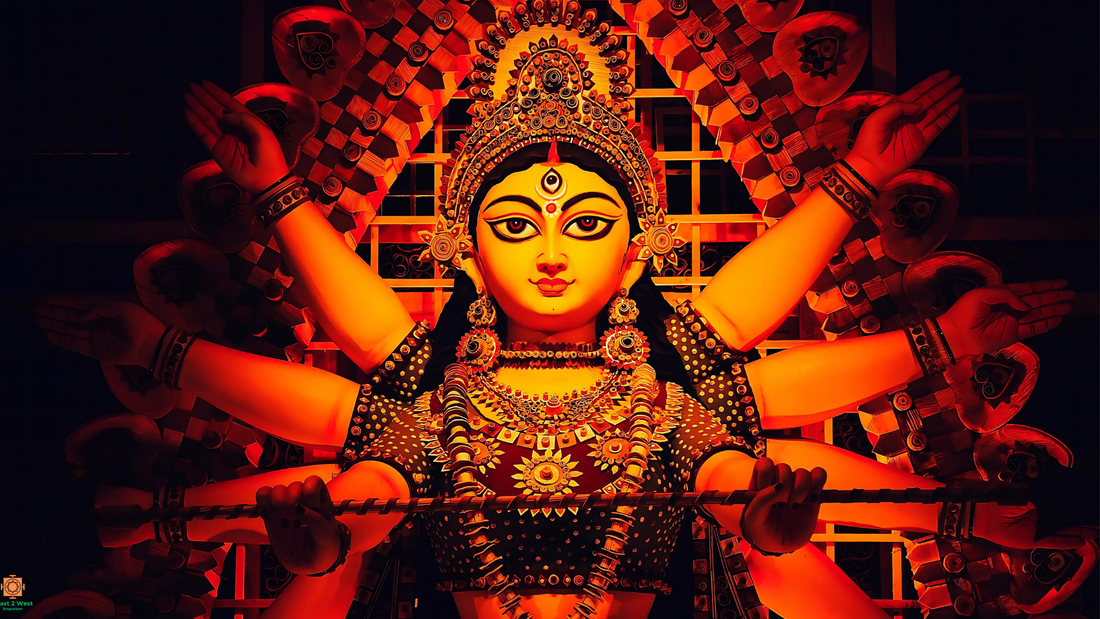
Navaratri 2024
Navratri, which means "nine nights," is a significant Hindu festival that honors the divine feminine and the triumph of good over evil. Each of the nine days is dedicated to a different form of Goddess Durga, symbolizing different aspects of her power, and is also associated with the destruction of specific negative qualities or evils. Here's a breakdown of the symbolisms behind each day and the corresponding evil that is vanquished:
1. Day 1: Shailaputri (Daughter of the Mountain)
- Symbolism: Goddess Shailaputri represents Prakriti (nature) and the essence of existence.
- Evil destroyed: Ignorance. The first day signifies breaking free from ignorance and starting the spiritual journey.
2. Day 2: Brahmacharini (The Ascetic)
- Symbolism: She embodies devotion, penance, and the pursuit of wisdom.
- Evil destroyed: Selfishness and greed. This day encourages control over desires and living a life of discipline and purity.
3. Day 3: Chandraghanta (The Warrior Goddess)
- Symbolism: She is the embodiment of courage and grace in battle, with a bell-shaped half-moon on her forehead.
- Evil destroyed: Fear. She represents the removal of fear and the ability to face life’s challenges with valor.
4. Day 4: Kushmanda (The Creator of the Universe)
- Symbolism: Goddess Kushmanda is believed to have created the universe with her smile, symbolizing creative energy.
- Evil destroyed: Ego. This day is about conquering arrogance and nurturing humility, which is essential for creation.
5. Day 5: Skandamata (The Mother of Skanda, or Kartikeya)
- Symbolism: She represents the nurturing aspect of motherhood and protection.
- Evil destroyed: Jealousy and anger. This day encourages compassion and love, dissolving negative emotions like jealousy and rage.
6. Day 6: Katyayani (The Fierce Warrior)
- Symbolism: She symbolizes fierce vengeance against the forces of evil.
- Evil destroyed: Hatred. The sixth day signifies overcoming hatred and cultivating a sense of justice and righteousness.
7. Day 7: Kalaratri (The Dark Goddess)
- Symbolism: Kalaratri, also known as Kali, represents the most ferocious and destructive aspect of the goddess, eliminating darkness and ignorance.
- Evil destroyed: Darkness and ignorance. On this day, the dark qualities of ignorance and negativity are eradicated, and clarity is achieved.
8. Day 8: Mahagauri (The Radiant Goddess)
- Symbolism: She symbolizes purity, peace, and serenity, representing the transformation after destruction.
- Evil destroyed: Impurity. This day focuses on the destruction of impure thoughts, actions, and intentions, leading to inner purity.
9. Day 9: Siddhidatri (The Giver of Supernatural Powers)
- Symbolism: Siddhidatri is worshipped as the goddess who grants Siddhis (spiritual powers or accomplishments).
- Evil destroyed: All negative energies. The final day symbolizes the removal of ignorance, granting enlightenment, and spiritual power.
Destruction of Evil Qualities
The nine days of Navratri not only celebrate the divine feminine energy but also represent the internal purification of negative traits within oneself. The destruction of greed, ego, anger, hatred, fear, and ignorance during these days paves the way for spiritual growth, harmony, and balance in life. Each day’s goddess inspires devotees to adopt qualities like courage, wisdom, compassion, purity, and devotion, while vanquishing the darker aspects of human nature.
The Spiritual Significance of Navratri: Celebrating the Triumph of Good Over Evil
Navratri, a vibrant and deeply spiritual festival celebrated by Hindus across the world, is a time of devotion, worship, and self-reflection. The word Navratri comes from the Sanskrit words "Nav" (nine) and "Ratri" (night), meaning "nine nights." During these nine sacred nights and days, Hindus honor the divine feminine energy, particularly in the form of Goddess Durga.
Each of these days symbolizes the victory of good over evil and is dedicated to different aspects of the Goddess, signifying a transformative journey toward spiritual purification and enlightenment.
The Deeper Meaning Behind Navratri
Navratri is more than just a celebration of the goddess; it is a symbolic journey toward the destruction of our own inner negativities. Each of the nine days reflects the victory over specific evils—like ignorance, greed, hatred, and fear—through the worship of Durga in her various forms. These evils represent the darker aspects of human nature, and through devotion, meditation, and self-reflection, we strive to overcome them.
Throughout these nine nights, devotees undertake fasting, chanting, and performing rituals to invoke the goddess's blessings and cultivate qualities like courage, compassion, wisdom, and purity. Navratri teaches us that true victory lies not only in external battles but also in conquering our own inner struggles.
Navratri’s Universal Message: The Triumph of Good Over Evil
The essence of Navratri is the triumph of good over evil, which is not only reflected in mythology but also in our everyday lives. The slaying of the demon Mahishasura by Goddess Durga symbolizes the defeat of negativity and ignorance, and the emergence of hope and righteousness.
In modern times, Navratri reminds us to conquer our personal demons—whether they be doubts, insecurities, anger, or ego—and embrace the light of knowledge, love, and self-awareness.
Navratri also emphasizes the significance of the divine feminine. It celebrates the strength, wisdom, and nurturing nature of women, recognizing the critical role that the feminine force plays in maintaining the balance of life. Goddess Durga’s many forms symbolize various facets of power, from creation to destruction, and from love to justice.
Celebrating Navratri: A Time for Reflection and Renewal
In conclusion, Navratri is a festival of devotion, celebration, and spiritual transformation. It teaches us to face our fears, purify our hearts, and allow the divine energy of Goddess Durga to guide us toward a life of righteousness, balance, and inner peace.
May the blessings of Goddess Durga empower you to destroy the evils within and emerge stronger, wiser, and more compassionate.
Happy Navratri!

